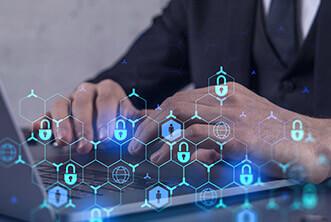Secure Remote Access
With the rise of remote work and the increasing need for employees to access corporate resources from various locations, secure remote access has become a critical component of modern business operations.
Secure Remote Access: Enabling Secure and
Efficient Remote Work
Remote work has become an increasingly prevalent mode of operation for businesses and organizations. This shift has been driven by technological advancements, the globalization of the workforce, and the desire to enhance employee flexibility and productivity.
However, the expansion of remote work also introduces new cybersecurity challenges, necessitating the implementation of robust secure remote access solutions.

Secure remote access encompasses the security measures, policies, and technologies employed to provide authorized users with safe and controlled access to corporate resources, applications, and data from remote locations outside the traditional office environment. It aims to establish a secure connection between remote users and the organization's internal network while safeguarding sensitive information and preventing unauthorized access.
Key Components of Secure Remote Access
Effective secure remote access strategies typically involve a combination of the following components:
- Multi-Factor Authentication (MFA): MFA adds an extra layer of security by requiring users to provide multiple verification factors, such as passwords, one-time codes, or biometric authentication, to gain access.
- Virtual Private Networks (VPNs): VPNs create encrypted tunnels through the public internet, enabling secure communication between remote users and the organization's network, protecting data from interception.
- Remote Desktop Gateways (RDGs): RDGs provide secure access to corporate desktops and applications from remote locations, allowing users to work seamlessly without exposing the organization's internal infrastructure.
- Access Control Policies: Granular access control policies define who can access what resources and applications, limiting access to authorized users and preventing unauthorized individuals from gaining access to sensitive information.
- Endpoint Security: Endpoint security solutions protect remote devices from malware, unauthorized access, and cyberattacks, ensuring that only secure devices are used to access corporate resources.
Benefits of Secure Remote Access
Implementing secure remote access solutions offers several benefits to organizations and their employees:
- Enhanced Security: Secure remote access safeguards sensitive data, prevents unauthorized access, and protects against cyberattacks, reducing the risk of data breaches and financial losses.
- Employee Flexibility and Productivity: Secure remote access enables employees to work from anywhere with an internet connection, promoting flexibility, work-life balance, and increased productivity.
- Reduced Infrastructure Costs: By enabling remote work, organizations can reduce the need for physical office space and associated overhead costs.
- Talent Acquisition and Retention: Secure remote access expands the talent pool by enabling organizations to hire qualified individuals regardless of their location, fostering a more diverse and inclusive workforce.
Considerations for Implementing Secure Remote Access
When implementing secure remote access solutions, organizations should consider the following factors:
- User Education and Training: Educating employees about secure remote access practices, such as strong password management and phishing awareness, is crucial to minimize human error and security vulnerabilities.
- Regular Security Audits and Assessments: Regularly conducting security audits and assessments helps identify and address potential security gaps in the remote access infrastructure.
- Continuous Monitoring and Response: Continuous monitoring of remote access activities and prompt response to security incidents are essential for maintaining a robust security posture.
Secure remote access has become an indispensable component of modern business operations, enabling organizations to reap the benefits of remote work while maintaining a high level of cybersecurity. By implementing comprehensive secure remote access solutions, organizations can empower their employees to work from anywhere, enhance productivity, and expand their global reach while safeguarding sensitive data and mitigating cybersecurity risks.
Let's Protect Your Network with Secure Remote Access!
Work quickly to identify secure remote access needs and outline a plan of action. Contact a Redline Networks expert today.